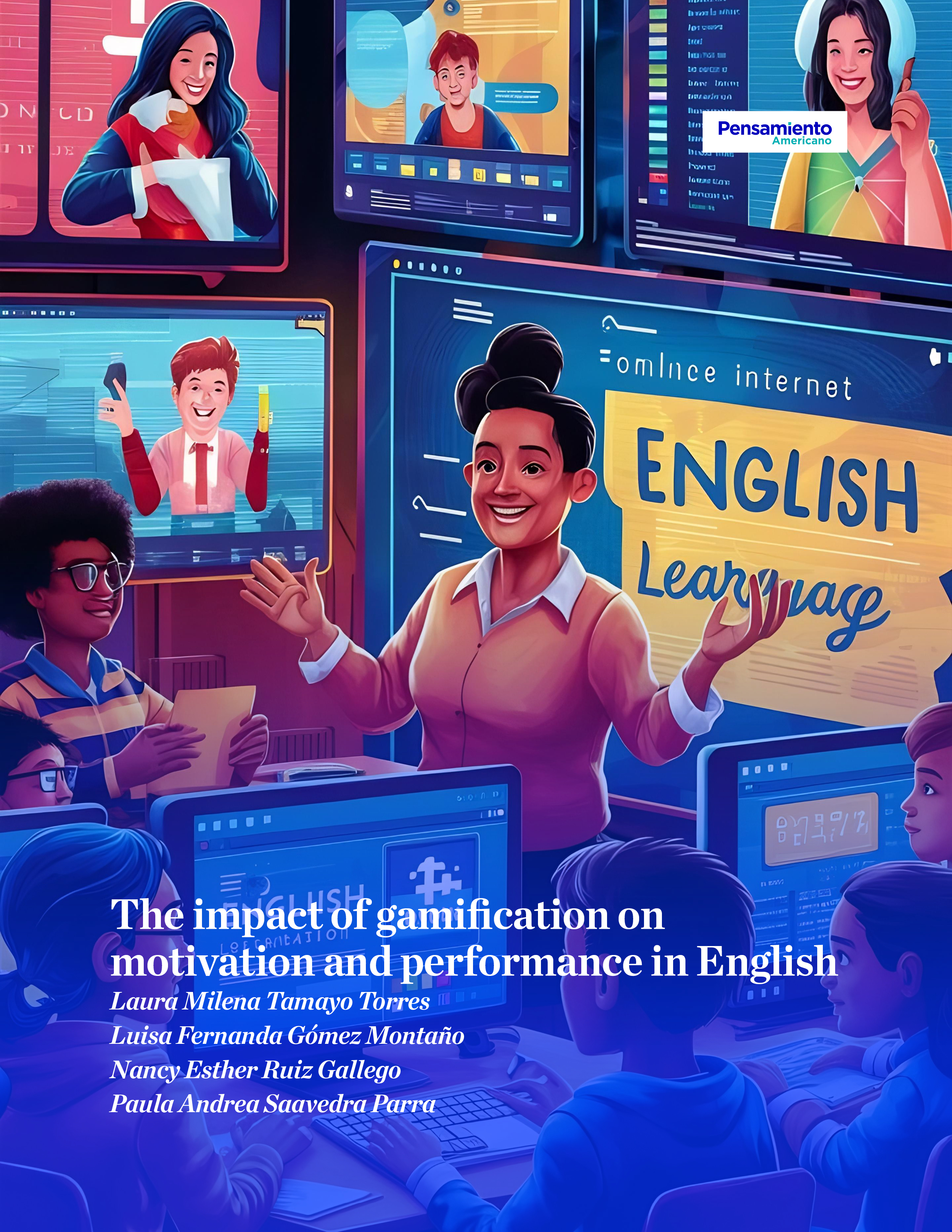The impact of gamification on motivation and performance in English
DOI:
https://doi.org/10.21803/penamer.18.37.841Keywords:
Gamification, Language teaching, Educational Innovations, Artistic Education, school performanceAbstract
Introduction: This project highlights gamification as an innovative pedagogical strategy to enhance motivation and academic performance in learning English as a foreign language. Objective: To design, implement, and evaluate a gamified English manual tailored to students’
needs, in response to the inefficacy of traditional methods and the heterogeneity of language proficiency levels. Methodology: The study was conducted with fourth-grade students at Colegio Adventista del Sur in 2024, adopting a qualitative approach that included questionnaires, interviews, observations, and group discussions. Teacher and student training was also considered to ensure appropriate use of the developed material. Results: Gamification improved content retention, particularly in grammar, and encouraged
active student participation, emerging as an effective alternative to traditional models. Conclusions: The project provides concrete and transferable didactic tools to transform the English teaching-learning process in school settings.
Downloads
References
Alvis Vargas, Z. L., Ramos Reyes, D. E., Páez Vargas, M. P., Iglesias Ortega, E., & Arana Palomino, W. (2019). Estrategias para la enseñanza de competencias lectoras en el grado décimo del Colegio Adventista del Atlántico “ Max Trummer” [Trabajo de Maestría, Corporación Universitaria Adventista]. https://repository.unac.edu.co/handle/11254/1029
Coello, Y. (2021). Realidad y desafíos de la investigación cualitativa en la educación. Revista Qualitas, 23(23), Article 23. https://doi.org/10.55867/qual23.06
Colegio Adventista del Sur. (2022). PEI Colegio Adventista del Sur.
Denzin, N. K., & Lincoln, Y. S. (Eds.). (2011). The SAGE Handbook of Qualitative Research (4th ed.). SAGE Publications, Inc.
Flick, U. (2018). The SAGE Handbook of Qualitative Data Collection (1st ed.). Sage Publications, Inc.
Gadamer, H. G. (2013). Truth and Method (3rd ed.). Bloomsbury Academic.
González González, C. (2019). Gamificación en el aula: Ludificando espacios de enseñanza- aprendizaje presenciales y espacios virtuales. https://doi.org/10.13140/RG.2.2.34658.07364
Huamaní Quispe, M. del C., & Vega Vilca, C. S. (2023). Efectos de la gamificación en la motivación y el aprendizaje. Horizontes. Revista de Investigación en Ciencias de la Educación, 7(29), 1399–1410. https://doi.org/10.33996/revistahorizontes.v7i29.600
Jara Ramírez, M. A., & Montoya Bedoya, Á. C. (2022). Metodología activa: Gamificación. In M. A. Jara Ramírez (Ed.), Estrategias Pedagógicas Innovadoras (p. 292). SEDUNAC. https://repository.unac.edu.co/handle/11254/1209
Koivisto, J., & Hamari, J. (2019). The rise of motivational information systems: A review of gamification research. International Journal of Information Management, 45, 191–210. https://doi.org/10.1016/j.ijinfomgt.2018.10.01
Marín Montes, V. (2023, January 22). Colombia sigue “rajada” en aprendizaje de inglés: Las preocupantes cifras de la nueva medición. Noticias de Cali, Valle y Colombia - Periodico: Diario El País. https://www.elpais.com.co/educacion/colombia-sigue-rajada-en-aprendizaje-de-ingles-las-preocupantes-cifras-de-la-nueva-medicion.html
Patton, M. Q. (2014). Qualitative Research & Evaluation Methods: Integrating Theory and Practice (4th ed.). SAGE Publications, Inc.
Poveda Pineda, D. F., Limas-Suárez, S. J., & Cifuentes Medina, J. E. (2023). La gamificación como estrategia de aprendizaje en la educación superior. Educación y Educadores, 26(1), 1–18. https://doi.org/10.5294/edu.2023.26.1.2
Prieto-Andreu, J. M., Gómez-Escalonilla-Torrijos, J. D., & Said-Hung, E. (2022). Gamificación, motivación y rendimiento en educación: Una revisión sistemática. Revista Electrónica Educare, 26(1), 1–23. https://doi.org/10.15359/ree.26-1.14
Sailer, M., Hense, J. U., Mayr, S. K., & Mandl, H. (2017). How gamification motivates: An experimental study of the effects of specific game design elements on psychological need satisfaction. Computers in Human Behavior, 69, 371–380. https://doi.org/10.1016/j.chb.2016.12.033
Saldaña, J., & Omasta, M. (2021). Qualitative Research: Analyzing Life (2nd ed.). SAGE Publications, Inc.
Smith, J. A., & Nizza, I. E. (2021). Essentials of Interpretative Phenomenological Analysis (1st ed.). American Psychological Association.
Tamayo Torres, L. M., & Gómez Montaño, L. F. (2024). Impacto de la gamificación en la motivación y el rendimiento académico en el inglés de los estudiantes del grado 4° del Colegio Adventista del Sur. Corporación Universitaria Adventista.
Van Manen, M. (1990). Researching Lived Experience: Human Science for an Action Sensitive Pedagogy (2nd ed.). State Univ of New York Pr.

Downloads
Published
Issue
Section
License
Copyright (c) 2025 Pensamiento Americano

This work is licensed under a Creative Commons Attribution-NonCommercial-NoDerivatives 4.0 International License.
The author or authors of an article accepted for publication in the Journal Pensamiento Americano will transfer all of the patrimonial rights to the American University Corporation free of charge, within which are included: the right to edit, publish, reproduce and distribute both print media as digital, in addition to include in article in international indexes and / or databases, likewise, the Editorial Seal is authorized to use the images, tables and / or any graphic material presented in the article for the design of covers or posters from the same magazine. By assuming the patrimonial rights of the article, it may not be partially or totally reproduced in any printed or digital media without its express permission.
AUTHORITY ASPECTS
For the Pensamiento Americano Journal, all the authors of an article have made substantial contributions to the research and the manuscript, and they share the responsibility when the article presents errors, fraud in some way or violations of copyright.
After submitting an article, the journal does not accept the addition, deletion or change in the order of the authors, in addition we reserve the right to release the article when it has been submitted to the journal and under no circumstances will American Thought accept the article. withdrawal of an article during any phase of the editorial process





